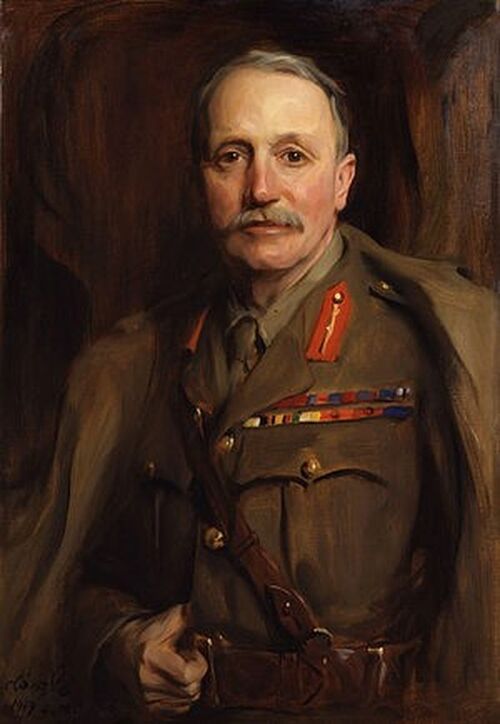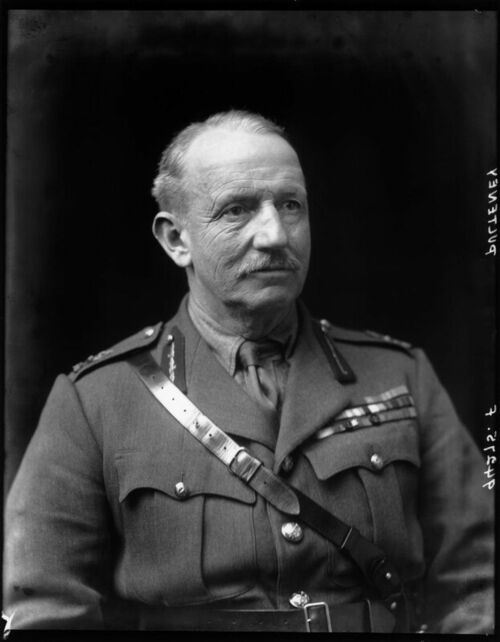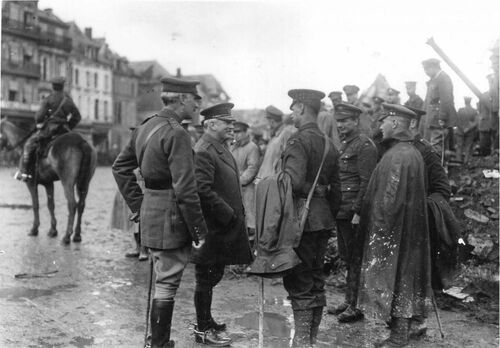Auction: 23001 - Orders, Decorations and Medals
Lot: 467
The outstanding mounted group of fifteen miniature dress medals worn by Lieutenant-General Sir W. P. Pulteney, G.C.V.O., K.C.B., K.C.M.G., D.S.O., Scots Guards later G.O.C. 3rd Army Corps and Gentleman Usher of the Black Rod, a quintessential Victorian gentleman-soldier awarded his D.S.O. for actions fighting slavers in Central Africa and later doing sterling work as a Battalion commander through some of the toughest fighting of the Anglo-Boer War
Pulteney's career took a turn when he reached General rank, being involved in the Curragh incident he was later to be castigated for his performance throughout the Great War - allegedly making him the inspiration for Blackadder's General Melchett - he was removed after his failure to prepare against an enemy counter-attack during the Battle of Cambrai
The Most Honourable Order of the Bath, Badge, gold and enamel; The Most Distinguished Order of St. Michael and St. George, Badge, silver-gilt and enamel; The Royal Victorian Order, Badge, silver and enamel; Distinguished Service Order, V.R., silver-gilt and enamel; Egypt and Sudan 1882-89, 1 clasp, Tel-El-Kebir; Central Africa 1891-98, with ring suspension; Queen's South Africa 1899-1902, 6 clasps, Belmont, Modder River, Driefontein, Johannesburg, Diamond Hill, Belfast; King's South Africa 1901-02, 2 clasps, South Africa 1901, South Africa 1902; 1914 Star; Coronation 1911; France, Republic, Legion of Honour, silver-gilt and enamel; Belgium, Kingdom, Order of the Crown, silver-gilt and enamel; Japan, Empire, Order of the Rising Sun, silver-gilt and enamel; Belgium, Kingdom, Criox De Guerre; Khedive's Star, mounted as worn, minor chipping to the enamel of second, central badge of twelfth missing, overall very fine (15)
K.C.B. London Gazette 18 February 1915.
K.C.M.G. London Gazette 1 January 1917.
G.C.V.O. London Gazette 3 June 1930.
D.S.O. London Gazette 3 November 1891:
'In recognition of services in the recent operations against slave-trading Arabs in the Uganda Protectorate.'
Legion D'Honour London Gazette 19 March 1915.
Order of the Crown London Gazette 24 February 1916.
Order of the Rising Sun London Gazette 21 July 1919.
Croix De Guerre London Gazette 11 March 1918.
William Pulteney Pulteney was born at Rectory House, Ashley, near Market Harborough on 18 May 1861. His father, Reverend Richard Pulteney was the Rector of Ashley while his mother, Emma Pulteney, was the daughter of Maximilian Dalison of Hamptons, Kent. The young Pulteney was the sixth child and, after attending Eton between 1875-77, he took the traditional route for the younger children of the gentry by taking a commission with the Militia in October 1878. Entering the Scots Guards with the rank of Second Lieutenant from the Militia on 23 April 1881 he was soon promoted Lieutenant on 1 July.
The outbreak of Ahmed Urabi's revolt in Egypt precipitated a British intervention which included the Scots Guards: Pulteney was present for the Action at Mahuta and after that the Battle of Tel-el-Kebir. In this major engagement the Guards were on the British right and less heavily engaged than their compatriots in the Highland Brigade on the left.
Pulteney continued to serve, and after almost a decade of soldiering he got a chance to make his mark. Promoted Captain on 4 May 1892 he was seconded for service under the Foreign Office on 15 February 1895, and was sent to the nascent Uganda Protectorate as an officer in the Uganda Rifles; that same year was to earn his Central Africa Medal for his role in the Lnyoro Expedition. Again called to service, Pulteney was to win the D.S.O. for his actions during the first Nandi Expedition (1895-96) as one of the officers commanding a column of four hundred Ugandan troops. He was promoted Major for his services on 1 May 1897 and presented with his D.S.O. by Queen Victoria herself in an investiture at Windsor on 9 July 1897.
Given the role of Vice-Consul in the Congo Free State on 31 December 1898 Pulteney had not served here long when news of war threatening from South Africa brought him back to his old Regiment. Promoted Brevet Lieutenant-Colonel on 11 November 1899 the Battalion saw appallingly bloody fighting at Belmont and Modder River. Lord Methuen's report on the former gives stark testament to their stoic advance under withering fire, stating:
'The Scots Guards carried out their instructions to the letter, and gained the heights at the point of the bayonet'
After the breakthrough in the New Year Pulteney was given command of the Battalion and led it through the rest of the fighting, being 'mentioned' three times in the course of the war. He commanded the unit throughout the guerrilla phase of the conflict, leading it through a number of notable actions and earning high praise from General French when the war was finally won. Promoted Brevet Colonel on 1 April 1904 he was awarded the C.B. on 30 June 1905 in the King's Birthday Honours List. He was further advanced Brigadier-General on 7 February 1908 while commanding 16th Brigade in Southern Ireland.
Again promoted - this time to Major-General - on 1 January 1909 Pulteney was given command of the 6th Division in Southern Ireland. In this role he was notably involved in planning the British show of force in Northern Ireland which eventually led to the Curragh Incident in March 1914. Despite his involvement in what was for everyone an embarrassing crisis, Pulteney's star continued to rise as he was promoted Lieutenant-General on 5 August 1914 and posted to command III Corps. This appointment raised no eyebrows at the time - however it would do so for generations to come as he had attended neither the Royal Military College, Sandhurst nor Staff College and apparently had little aptitude for staff work.
Pulteney's performance throughout the war was to prove poor: he was described as appearing like 'a peaceful country squire'. Indeed it was believed that his corps received a higher than normal crop of capable officers to make up for his failures. Serving as part of Rawlinson's Fourth Army during the Somme Offensive, Pulteney's unwillingness to properly manage his artillery is seen as one of the major causes for the high losses taken by III Corps in the fighting. Furthermore, he was behind the decision to support the attack on High Wood by the 47th (London Territorials) Division with tanks. This stopped the British from using heavy artillery near the tanks and prevented the vehicles from having a clear line of sight. Despite pleas from the Divisional commander to order the tanks to advance on either side of the wood, the attack went ahead with the wood falling only after 4,500 men became casualties.
In spite of this failure Pulteney remained in command of III Corps and led it through the Battle of Cambrai. The first massed tank offensive which the British launched here met with stunning success. However when warned of a German counter-attack Pulteney refused to act and the allied gains were swept aside by a massive offensive. Despite being officially cleared of blame he was removed from command, in the words of one historian: 'It is hard to see how he managed to survive for so long'. Post to XXIII Corps in Britain he remained with them until May 1919 when he was sent with Prince Arthur of Connaught on a Military Mission to Japan.
Retiring from the Military in January 1920 Pulteney served as Gentleman Usher of the Black Rod in the House of Lords. He also put his time and efforts into several service organisations such as the Ypres League; despite his wartime record recent histories have started to re-examine his record and especially his genuine concern for the welfare of the men under his command. Pulteney died at Pines Hill, Stansted, Essex on 14 May 1941 and he was buried at Ashley, Northamptonshire; sold together with a file of copied research comprising an M.I.C., London Gazette entries and an extract from The Distinguished Service Order as well as a typed biographical summary.
Subject to 20% VAT on Buyer’s Premium. For more information please view Terms and Conditions for Buyers.
Estimate
£1,400 to £1,800
Starting price
£1200











